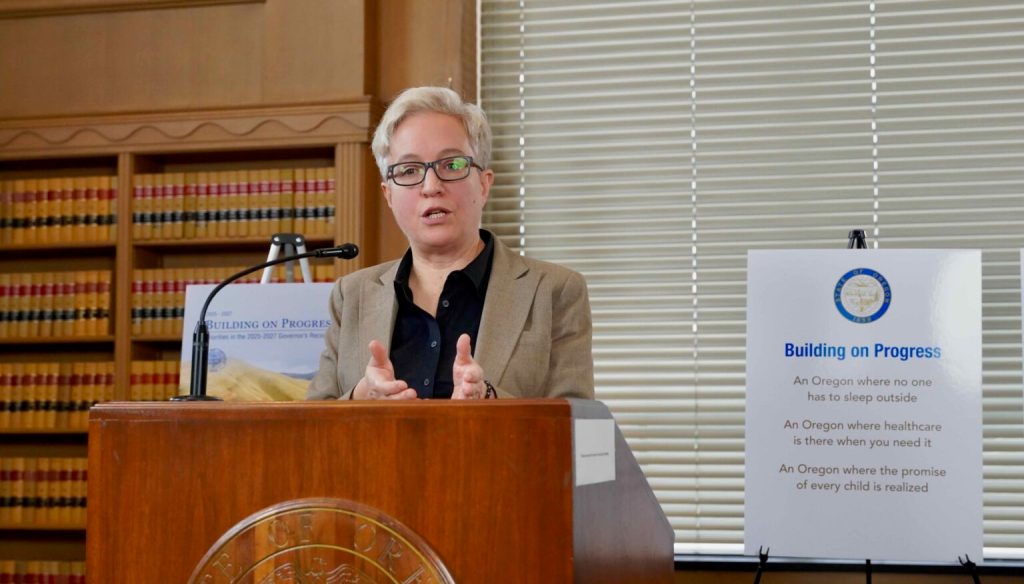Lawmakers in recent session gave Gov. Kotek more hiring, firing power over agency leaders
Published 6:45 am Thursday, July 10, 2025

- Gov. Tina Kotek discusses her 2025-27 recommended budget at the Oregon State Library in December. She is no stranger to taking the reins of an Oregon state agency when her expectations go unmet. (Julia Shumway/Oregon Capital Chronicle)
Several bills passed giving Oregon’s governor the power to select leaders for the state forestry and public defense agencies, and to fill vacant Senate seats
Gov. Tina Kotek is no stranger to taking the reins of an Oregon state agency when her expectations go unmet.
In her first year in office, she replaced the head of the state’s teacher licensing board amid a growing backlog of misconduct complaints and licensing delays, and she ordered the resignation of the state’s liquor and alcohol commission director following a bourbon hoarding scandal. In the last year, she axed leaders at the Oregon Department of Forestry, the Oregon Youth Authority, Oregon State Hospital and the Oregon Public Defense Commission.
Trending
Now, under two bills passed by lawmakers this past legislative session that are awaiting Kotek’s signature, the Oregon governor would have more control than ever over two of those agencies: the Oregon Department of Forestry and the Oregon Public Defense Commission.
A bill also passed granting Oregon’s governor the power to appoint someone to fill an unexpectedly vacant U.S. Senate seat, as most state governors are allowed. But a bill that would have granted the governor the power to select the head of the state Transportation Department did not pass.
The recent proposals shifting greater hiring and firing power to the governor are meant to help improve recruitment processes and create stronger support for agencies among the governor and state legislators, Kotek spokesperson Anca Matica said in an email.
The power shift is also meant to ensure the governor can intervene if an agency leader is not living up to her standards. Reporting earlier this year from The Oregonian/OregonLive detailed a growing trend of Kotek taking on more statewide power over regulations and rulemaking in contrast to her prior successors as a governor.
“Governor Kotek has high expectations for accountability and transparency of state agencies across the enterprise,” Matica said.
But they could also introduce new vulnerabilities while she tries to consolidate power. The bills allowing Kotek to choose new agency leaders require the Senate, with a slim Democratic majority, to approve nominees, too.
Picking the state forester
Trending
The state forester leads the Oregon Department of Forestry, which oversees management, logging and wildfire prevention on hundreds of thousands of acres of forests in Oregon. They’ve previously been chosen by the seven-member, governor-appointed Board of Forestry, which oversees the agency. But under Senate Bill 1051, Kotek and future governors would pick the agency’s leader, with consultation from the Oregon Senate.
The governor proposed the change after requesting the resignation of former State Forester Cal Mukumoto in January, following an emergency legislative session held to help the state forestry agency pay its outstanding wildfire season bills, and executive investigations and firings over workplace misconduct, as reported by The Oregonian/OregonLive.
In February, following the bill’s introduction, Matica told the Capital Chronicle that operational and management issues with the Department of Forestry had become “a distraction” and that the agency required more oversight responsibility “than is reasonable to expect of those who volunteer to serve on the Board.”
The board and forestry agency leaders are still reviewing the legislation, according to spokesperson Joy Krawczyk.
Senate Bill 1051 tweaks the experience necessary to become the State Forester. Traditionally its gone to candidates with experience in forest management for logging and timber production, not necessarily experience with wildfires, conservation or ecology. Under Senate Bill 1051, the state forester would not need to have a timber-specific background, but one of their deputies would have to be a “practical forester,” who is “familiar with western conditions and experienced in organization for the prevention of forest fire.” The Portland-based Wild Salmon Center, a nonprofit conservation group that did not take a position on the bill, welcomed the changes.
“This creates an opportunity to bring on a State Forester that can better respond to the needs of today, including habitat protections for fish and wildlife, climate resilience, and ensuring clean water for all Oregonians,” said Stacey Detwiler, the group’s lobbyist and policy director, in a written statement.
The Oregon Forest Industries Council, a timber industry trade group, had initially opposed the bill because the original version “removed fundamental qualification requirements,” spokesperson Sara Duncan said in an email. But the group came around when the bill was amended to maintain some requirements for forest management experience among agency leaders.
“Just cause” firings for defense commission
House Bill 2614 would allow Kotek to fire the executive director of the state’s defense commission so long as she has “just cause.” The law requires her to consult with the 13-member, governor-appointed board of the commission before she attempts to replace the agency head, and allows her to remove board members if she identifies “inefficiency, neglect of duty or malfeasance in office.”
A spokesperson for the Oregon Public Defense Commission, Tiffany Woods, said the agency plans to follow any legislative changes made. The defense commission, meant to meet Oregon’s constitutional duty to provide every criminal defendant with a lawyer, drew headlines in April after Kotek fired its then-executive director for failing to adequately address an ongoing shortage of public defenders, particularly in six “crisis” counties across the state.
Jennifer Nash, chair of the Oregon Public Defense Commission, said in an email that the changes to the leadership process “bring OPDC in line with other Executive Branch agencies’ processes regarding the removal and replacement of an executive director.”
“The Commission understands the need for consistency in that process across Executive Branch agencies, and it understands the Legislature’s efforts to create that consistency while ensuring that the Commission is involved in the process of replacing an executive director after a vacancy,” she wrote.
Power over Senate seats, no caps on bills yet
One of the bills shifting statewide power to Oregon’s governor, however, centered on federal representation for the state, not its agency leaders. During the most recent session Kotek signed into law Senate Bill 952, which gives her and future Oregon governors the authority to appoint someone from the same political party as an outgoing U.S. senator within 30 days of their passing away, stepping down or otherwise being unable to serve in their position.
Another bill, House Bill 2006, would have prohibited lawmakers from introducing more than 25 pieces of legislation each session, while allowing the state’s governor to introduce no more than 400 on her own behalf and on behalf of state agencies. The legislation drew fierce criticism and claims of partisan overreach from Oregon Republicans who hold minorities in both the state House and Senate.
House Speaker Julie Fahey, D-Eugene, one of the bill’s lead sponsors, told her colleagues in a May committee hearing that she agreed 400 bills for the governor and agencies was too high, and the bill languished in the House Committee on Rules. In a brief interview at the end of the session, Fahey said she plans to reattempt the effort in a future session, but is still deciding the extent to which those bill limits could change.









